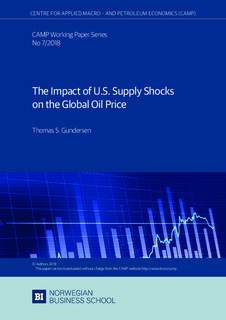The Impact of U.S. Supply Shocks on the Global Oil Price
Abstract
I examine the role of the U.S. shale oil boom in driving global oil prices. Using a structural vector autoregressive (SVAR) model that identifies separate oil supply shocks for the U.S. and OPEC, I find that U.S. supply shocks have exerted considerable negative pressure on the oil price. More specifically, U.S. supply shocks explain up to 13% of the oil price variation over the 2003–2015 period, considerably more than what has been found in other studies. However, the timing of the downward pressure on prices is delayed relative to the boom in U.S. shale oil production. This mismatch implies a temporary friction in the transmission of U.S. supply shocks to the rest of the world likely caused by logistical and technological challenges in the downstream supply chain.
